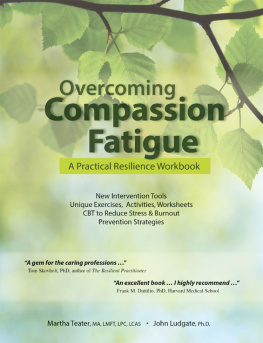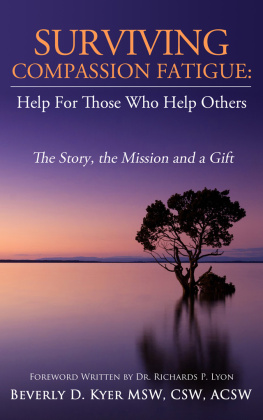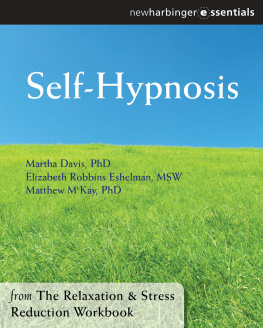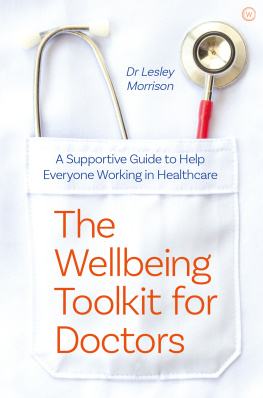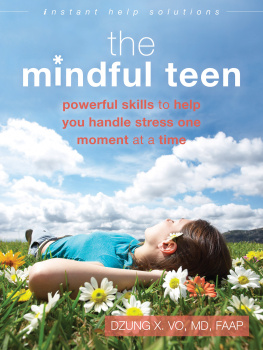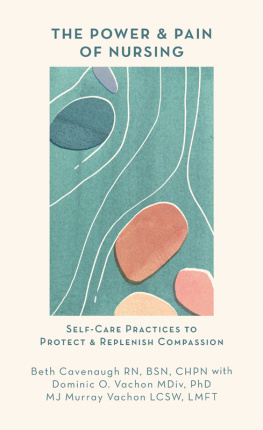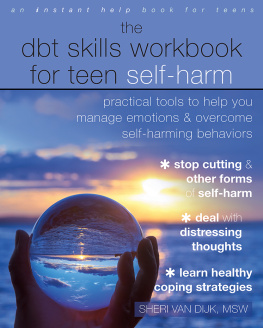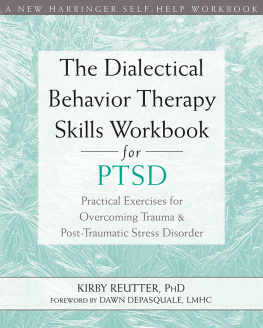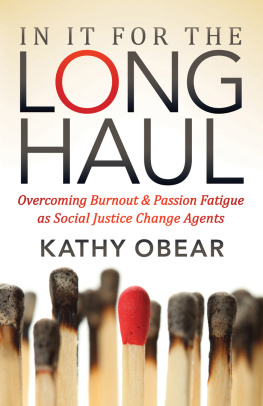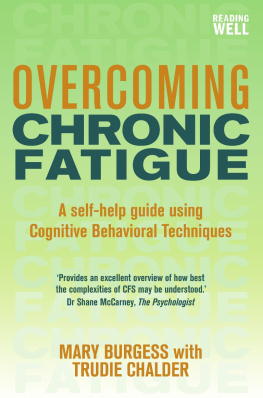Overcoming Compassion Fatigue offers an invaluable resource that will benefit all practitioners rookies and veterans alike. This well-researched workbook is filled with practical self-assessment tools and concrete strategies for detection, intervention and prevention. Integrating CBT techniques provides a unique and very hands-on approach to managing compassion fatigue and related symptoms of caregiver stress. Overcoming Compassion Fatigue is a much needed addition to our field and I look forward to sharing it with my colleagues and students.
Franoise Mathieu, M.Ed., CCC, author of The Compassion Fatigue Workbook: Creative Tools for Transforming Compassion Fatigue and Vicarious Traumatization
This is an excellent book that addresses an important and timely topic for anyone working in the helping profession. It is well written and engaging, and provides assessment measures and helpful exercises that are invaluable to the reader. I highly recommend to anyone who is a care provider.
Frank M. Dattilio, Ph.D., ABPP, Department of Psychiatry, Harvard Medical School
Martha Teater and John Ludgate offer a generous gift to practitioners in the caring professions with their book Overcoming Compassion Fatigue: A Practical Resilience Workbook. They nudge the reader with many self-awareness inventories and checklists to be mindful of the message---remember to practice self-care as you offer others care. The writing is clear, compelling and instructive. This is a gem of a contribution to the self-care and resiliency literature!
Tom Skovholt, Ph.D., LP author of The Resilient Practitioner and Becoming a Therapist
This is a must read for all levels of psychotherapists in the human service and mental health fields. This CBT Model, self help guide offers information on burnout, risks, and rewards of the helping profession. This workbook is a great resource to take care of ourselves to remain active and happy. I highly recommend this easy-to-read book and plan on sharing it with my staff.
Rudy Flora, LCSW, ACSW, CSOTP co-author of How to Work With Sex Offenders (2nd Edition)
OVERCOMING COMPASSION FATIGUE
A Practical Resilience Workbook
By
Martha Teater, MA , LMFT , LPC , LCAS
John Ludgate, PhD

Copyright 2014 by Martha Teater and John Ludgate
Published by
PESI Publishing & Media
PESI, Inc
3839 White Ave
Eau Claire, WI 54703
Cover Design: Amy Rubenzer
Layout Design: Bookmasters
Edited by: Marietta Whittlesey
Printed in the United States of America
ISBN: 978-1-937661-44-1
All rights reserved. Reproduction of the handouts included in this book is highly encouraged for professional use with clients and students. All pages are copyrighted and permission to reproduce is only granted if the header and footer at the top and bottom of the page are included in the copy. Reproduction for all other purposes requires written permission from the author (except for the inclusion of brief quotations in a review).

For Don, with gratitude and much love.
And for our family:
Luke, Betsey, and Nora
Kevin and Heather
And with thanks to all those who have entrusted me with their stories through the years.
Martha
For the three best antidotes to my stress, my sons Daniel, Matthew and Conor.
And with appreciation to the many clients over more than three decades who have taught me so much.
John
Acknowledgements
It is with a deep sense of gratitude that we acknowledge the contributions of so many who expanded our knowledge of both compassion fatigue and cognitive behavioral therapy.
First and foremost, we thank the pioneers who led the way in compassion fatigue identification, treatment, and prevention: Francoise Mathieu, Dr. Charles Figley, Dr. Beth Hudnall-Stamm, Dr. Laurie Anne Pearlman, Dr. John Norcross, Dr. Thomas Skovholt, and others.
Our understanding of CBT would be limited were it not for leaders in the field such as Dr. Aaron Beck, who changed the course of psychotherapy and the fate of innumerable clients indirectly through his writing, research and teaching, and also inspirational mentors such as Dr. Ivy Blackburn, Dr. Fred Wright, Dr. Robert Berchick and Dr. David M. Clark.
What we know about compassion fatigue and CBT might have remained abstract and detached if it werent for the many people who have shared their stories with us. Heartfelt thanks go to our clients, our professional peers and thousands of workshop participants who have openly given us glimpses into their lives. We owe a debt to so many, and it is our hope that this workbook might be a small repayment of all that weve been given.
This workbook has been sharpened by the keen eye and skilled touch of Linda Jackson at PESI Publishing and Media. Linda patiently and expertly guided this whole process, helping us develop a workbook that is focused and clear. Thanks also to our editor, Marietta Whittlesey, who organized our material into a more well-defined whole. We are both appreciative of the good people at PESI/CMI Education for enabling us to hit the road as professional trainers, giving us the rich experience of getting to know thousands of clinicians and hone our skills as professionals.
Finally, we thank the many clinicians who honor us by courageously sharing their stories. Its a privilege to work in this field, and its not one we take lightly.
Thank you.
Martha Teater
John Ludgate
Marthas Preface
Like many of you, I started my career with enthusiasm and idealism. I had high hopes and the lofty expectation that I could have an impact on people and really make a difference for individuals and families.
I have always been an empathetic person, curious about people and relationships. Even as a teenager I sought depth in friendships and thrived while delving into why people did what they did... what made people tick. A college degree in social work led me to my first job as a nursing home social worker, an experience that was a surprisingly rich learning experience. After getting a masters in counseling, I became licensed as a marriage and family therapist, professional counselor and clinical addictions specialist. I worked in addictions, integrated healthcare and indigent medical care, and have had a private practice since 1990.
So how does my enthusiasm and idealism compare to what it was way back when? Im probably not the only one of us who has seen it wax and wane through the years. When a client does well... my energy is high. Someone relapses, continues to struggle, or doesnt seem to get better... lets just say that my optimism sags.
My interest in compassion fatigue came as a direct result of Hurricane Katrina. As a Red Cross volunteer, I spent my first disaster mental health deployment in a shelter in the Gulf Coast. During that time I met many local mental health workers who were suffering similar losses to the people they were helping. I returned home to my usual work routine, but couldnt get those helpers off my mind. How would they cope with the despair all around them while so many were going through traumas and losses of their own?
Ive also seen plenty of people go through trauma and struggles during other disaster mental health deployments following floods, fires, tornadoes and other devastating events.

